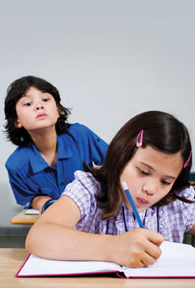
Ask The Teacher: Cheating, Picked On, And Student Focus
Q:
My child complains that a classmate often looks over her shoulder
during quizzes and tests. How should she handle this? She doesn’t want
to tattle-tell.
A:
I think it is important for both teachers and parents to explain to
their children the difference between “tattling” and “telling.” Tattling
is usually defined by wanting to get someone in trouble or have an
adult solve your problems. In the situation described above, the student
wouldn’t be tattling, she would be telling. When a student is
“telling,” the motivation is to help themselves or another. The behavior
the other student is exhibiting will hurt his or her academics, so it
is important that the teacher is told.
After explaining these differences to your child, have her request to
talk to the teacher in private. That way the student who is looking at
the test paper won’t know who disclosed the information. If the student
isn’t comfortable talking to the teacher, the parent can be the one to
reach out.
–
Melanie Vernon,
2nd Grade Teacher, Kehoe-France School
Q:
I feel like my son gets picked on by fellow students, but his teacher says she doesn’t see it. What should I do now?
A: It can become such an awkward and difficult situation when a parent and teacher don’t see or believe the same things. Often it seems this can lead to a relationship of apprehension and mistrust. It doesn’t have to be this way, however. For parents, it is important to first remember that teachers care about their students. If a teacher doesn’t happen to see a particular situation, it doesn’t mean they are condoning or promoting it. It would be best to ask to meet with the teacher once again and offer specific examples of the problem. This allows the teacher to hone in on a particular behavior from a particular student, using detailed information as opposed to circumstantial or vague, accusatory evidence.
It is also helpful to discuss your expected outcome with your child’s teacher. What do you want to see happen? I typically feel that it is best to also include your student in such a meeting. This helps to teach kids to articulate for themselves and also helps the parent and teacher with the details of an isolated event or ongoing problem.
-Sarah Block,
Upper School English Department Head, Middle School Coordinator, Student Council Advisor, Kehoe-France School
Q: Do you focus on strengths, or weaknesses, in the classroom?
A:
The development of the “well-rounded,” independent, and resilient child is generally most teachers’ goal for their students. As admirable as this goal may be, it is not always realistically or easily attainable. All students need to feel successful to promote self-confidence, so a teacher should primarily provide choices of activities that focus on students’ strengths.
That being said, a teacher should also strive to bolster students’ weaknesses while allowing the student to gain confidence in their capabilities. Giving the student many opportunities to successfully persevere through challenging assignments may permit them to use their strengths while improving their weaknesses.
– Penny Pirri, 3rd Grade Lead Teacher, Trinity Episcopal School

